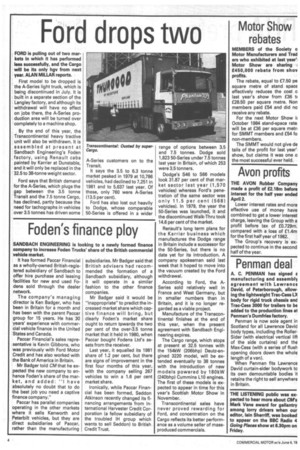Ford drops two
Page 6

If you've noticed an error in this article please click here to report it so we can fix it.
FORD is pulling out of two markets in which it has performed less successfully, and the Cargo will be its only hgv from next year. ALAN MILLAR reports.
First model to be dropped is the A-Series light truck, which is being discontinued in July. It is built in a separate section of the Langley factory, and although its withdrawal will have no effect on jobs there, the A-Series production area will be turned over completely to a machine shop.
By the end of this year, the Transcontinental heavy tractive unit will also be withdrawn. It is assembled at present at Sandbach Engineering's Foden factory, using Renault cabs painted by Karrier at Dunstable, and it will only be replaced in the 32.5 to 38-tonne weight sector.
Ford says that British demand for the A-Series, which plugs the gap between the 3.5 tonne Transit and the 7.5 tonne Cargo, has declined, partly because the need for tachographs in vehicles over 3.5 tonnes has driven some A-Series customers on to the Transit.
It says the 3.5 to 6.3 tonne market peaked in 1979 at 10,786 vehicles, had declined to 7,251 in 1981 and to 5,637 last year. Of these, only 760 were A-Series (13.5 per cent).
Ford has also lost out heavily to Dodge, whose comparable 50-Series is offered in a wider range of options between 3.5 and 7.5 tonnes. Dodge sold 1,823 50-Series under 7.5 tonnes last year in Britain, of which 253 were 3.5 ton ners.
Dodge's S46 to 566 models took 31.87 per cent of that market sector last year (1,570 vehicles) whereas Ford's penetration of the same sector was only 11.5 per cent (568) vehicles). In 1979, the year the 50-Series was launched, it and the discontinued Walk-Thru took 14.6 per cent of the market.
Renault's long term plans for the Karrier business which manufactures the Dodge range in Britain include a successor for the 50-Series, but there is no date yet for its introduction. A company spokesman said last week that it hoped to move into the vacuum created by the Ford withdrawal.
According to Ford, the ASeries sold relatively well in France and West Germany, but in smaller numbers than in Britain, and it is no longer regarded as a viable project.
Manufacture of the Transcontinental finishes at the end of this year, when the present agreement with Sandbach Engineering expires.
The Cargo range, which stops at present at 32.5 tonnes with the 154kW (206bhp) Deutz-engined 3220 model, will be extended eventually to 38 tonnes with the introduction of new models powered by 180kW (240bhp) Cummins LW engines. The first of these models is expected to appear in time for this year's Scottish Motor Show in November.
Transcontinental sales have never proved rewarding for Ford, and concentration on the Cargo reflects its better performance as a volume seller of massproduced commercials.
































































































